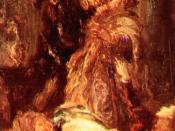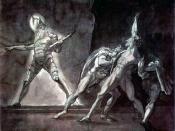Since the dawn of man evil has lurked the world. Whenever evil dominates good and disturbs the balance between the two, the universe becomes a like a wounded animal caught in a poachers trap; it will do anything to break free, even gnaw its own leg off. The universe continuously strives to rid itself of wrong doings, but to do so is near impossible. In Shakespeare's, Hamlet, evil has erupted in Denmark and is in need to have the two balanced once again. In the struggle to restore Denmark to its state of righteousness, it will undergo desperate measures to obtain this even, sacrificing numerous lives.
One death that needed to of happened was the death of King Hamlet's brother, Claudius, the root of evil in Elsinore. The ghost of King Hamlet makes his appearance in this play to serve as figure of justice. He notifies his son Prince Hamlet that he has been murdered and not accidentally killed he states:
Wouldst thou not stir in this.
Now, Hamlet, hear.
'Tis given out that, sleeping in my orchard,
A serpent stung me. So the whole ear of Denmark
Is by a forged process of my death
Rankly abused. But know, thou noble youth,
The serpent that did sting thy father's life
Now wears his crown. (1.5.41-47).
This murderous act performed by Claudius has up set the balance of good and evil. This sends Denmark into a state of chaos. The universe seeks to rid Claudius from this world and hires Hamlet to do its bidding. Hamlet disgusted by Claudius swears to the ghost he will avenge his death. Throughout the play Claudius has deceived everyone and uses others to get what he wants. He can be accounted for numerous evil acts. He hires two of Hamlets good friends, Rosencrantz and Guildenstern to spy on Hamlet and find out the reason behind his madness. In the end this only comes back to haunt them by getting them killed. Polonious the ass kissing, Lord Chamberlain was also summoned to spy on Hamlet, which got him killed as well. In the end he truly proves his cold heartedness, as he sits there and watches his "beloved wife" Gertrude drink the poisonous wine with out knowing. He does not even attempt to stop her; he merely whispers to himself, "It is the poisoned cup. It is too late"(5.2.319). It is as if he says this sarcastically. His reaction is near emotionless. By the end everyone finds out about his conspiracies and turn against him. Anyone that was even slightly affiliated in Claudius selfish and evil deeds was killed. Hamlet being pushed to the limit forces the king to drink his own poison, "Here, thou incestuous, {murd'rous,} damned Dane/ Drink off this potion. Is {thy union} here?"(5.2.336-337). After Claudius' death, Denmark was one step closer to amending the misbalance.
Few Shakespearean characters have raised as much uncertainty as Gertrude, the beautiful Queen of Denmark. This play seems to bring about numerous questions about Gertrude. Was she involved with Claudius before the death of her husband? Did she love her husband? Did she know about Claudius's plan to commit the murder? Did she love Claudius, or did she marry him just to keep her place in Denmark as a Queen? These questions can be answered by looking at her actions. Gertrude had an affair with Claudius before the death of King Hamlet. When she spoke to her son, and told him that his father has passed and there is no need to mourn over him any longer, she says:
Good Hamlet, cast thy knighted color off,
And let thine eye look like a friend on Denmark.
Do not forever with thy vailed lids
Seek for thy noble father in the dust.
Thou know'st tis common; all that lives must die,
Passing through nature to eternity. (1.2.70-75)
She cares not for the death of her ex-husband, she tells him it is apart of life everyone dies now get over it. She is nearly as sinister as Claudius. She seems to love neither of her husbands, but merely marries them to keep her place as Queen of Denmark. She does not seem to be the brightest of characters either as Hamlet says, "Frailty, thy name is woman!" (1.2.146). Gertrude does seem to exhibit herself as a morally frail woman. She never exhibits the ability to think critically about her situation. This is what causes her idiotic death as the play states, "He's fat and scant of breath. / Here, Hamlet, take my napkin; rub thy brows. / The Queen carouses to thy fortune, Hamlet."(5.2.313-315). This shows that she is always clueless and never realizes what happens in the world around her. Therefore not knowing the wine is poisoned she drinks it. The death of Gertrude will help rid Denmark of corruption.
The last death that was needed to restore Denmark to a state of sustainable good and evil is through the ironic killing of the "good Samaritan" Hamlet. Many believe that Hamlet has done no evil, but that can be argued. Prince Hamlet did have only good intentions; he solely wanted to avenge his father's death and bring Denmark out of its state of chaos. The killings of the numerous characters are where Hamlet had gone wrong. He could of gone about his revenge in a different manner, but he chose to kill. When he killed Polonius "accidentally" he showed no remorse, he says, "Thou wretched, rash, intruding fool, farewell. / I took thee for thy better. Take thy fortune. / Thou find'st to be too busy in some danger." (3.4.38-40). Hamlet simply comes up with an excuse for this accidental murder and all is better. He feels no pity for Ophelia, his so called "lover", he does not even apologize to her that he has slain her father. Hamlet also performs random acts of evil such as, when he tricked Rosencrantz and Guildentstern to England to be exiled. There really was no strong motive for the killing of his two schoolmates, merely because they reported to the King. So in the end, inevitably Hamlet must die, because he too performed sinister acts of evil. So when was good truly restored to its normal state of righteousness? This was achieved when Hamlet had given Denmark to Fortinbras, who was the only "noble" character in the play besides Horatio.
After the many random deaths that had occurred, the balance between good and evil once again was restored in Denmark, but only temporarily. No one person is completely free of evil, all humans in their subconscious mind have one time or another comes across an evil act. Many will use acts of evil to obtain things or in Hamlets case get revenge for his father's murder. This shows a lot about the world. Anyone or anything is capable of acquiring whatever they please as long as they are willing to sacrifice everything for it.


